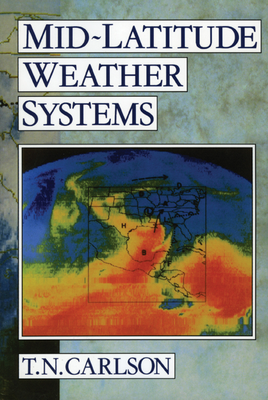Toby N. Carlson
- Professor of Meteorology Emeritus
University Park, PA 16802
Education:
- BS, MS MIT
- PhD Imperial College, University of London, England.
Biography:
Links to various publications and documents
Publish Date: 10/11/12
Paperback Edition: $49.95
Instructor copies also available for $10.00
Purchase book at Penn State University Press
 Presentation at the Heads & Chairs Meeting in Boulder, CO on October 12, 2006
Presentation at the Heads & Chairs Meeting in Boulder, CO on October 12, 2006 Crisis in Academic Funding (Dupont Summit 2008)
Crisis in Academic Funding (Dupont Summit 2008)- A Simple Method for Areal Evapotranspiration and Surface Soil Moisture from Optical and Thermal Infrared Satellite Measurements (MS Word Document)
- DO IT YOURSELF WEATHER FORECAST (MS Word Document)
Dr. Carlson is currently retired. His interests remain in remote measurement of regional-scale soil moisture and other boundary layer and surface parameters using satellites. His work extends to the modeling of plants and the way they control transpiration, and in urbanization/deforestation as viewed by satellite. He has written two books, the first is entitled "Mid Latitude Weather Systems" which is to be republished by Penn State Press, and the second "An Observers Guide to Clouds and Weather, is being published in 2014 by the AMS, which explains the factors responsible for the weather patterns, how these patterns manifest themselves on weather maps and how cloud observations can be used to understand the current weather an aid the forecaster in predicting the weather.
Research Interests
Satellite remote sensing applications to regional planning, modeling of evapotranspiration over plant canopies, land surface processes.
Teaching Interests
Bioclimatology, boundary layer meteorology, and remote sensing.
Selected Publications
The following represent a selection of representative journal articles out of a total of about 90.
- Arthur, S. T., T. N. Carlson and K. C. Clarke, 2003: Satellite and ground-based microclimate and hydrologic analyses into a regional urban planning model. Remote Sensing of Environment, 86, 385-400.
- Chang, H. and T. N. Carlson, 2004: Patterns of phosphorus and nitrogen concentrations in small central Pennsylvania streams. The Pennsylvania Geographer.
- Jiang, L., S. Islam, T. N. Carlson e 2004: Toward the uncertainty of surface fluxes estimation and implications for using a simplified approach with remote sensing. Canadian Journal of Remote Sensing.
- Carlson, T. N., 2004: Analysis and prediction of surface runoff in an urbanizaing watershed using satellite imagery. Journal of the American Water Resources Assn. [View Paper]
- Carlson, T. N., 2006: Deficiencies in the present funding process in meteorology, Bull. Am. Met. Soc., 87, 567-572.
- Carlson, T. N., 2007: An Overview of the "Triangle Method" for Estimating Surface Evapotranspiration and Soil Moisture from Satellite Imagery. Sensors, 7, 1612-1629.
- Carlson, T. N., 2007: Impervious Surface Area and its Effect on Water Abundance and Water Quality. Chapter 17, Part 5, Remote Sensing of Impervious Surfaces, Quhio Wang, Ed.
- Haase, A. T., C. N. Cudaback, and T. N. Carlson, 2008: Development of the Watershed Evaluation Tool using remotely sensed data. The Pennsylvania Geographer, 45, 3-20.
- Carlson, T. N., 2008: Land use and impervious surface area change by county in Pennsylvania (1985-2000) as seen in satellite imagery. Pennsylvania Geographer, 46, 56-70. [
 View Paper]
View Paper] -
Carlson, T. N., 2008: Current funding practices in academic science stifle creativity. Review of Policy Research (Dupont Summit issue), 25, 631-642.
- Lynn. B. H., T. N. Carlson, C. Rosenzweig, R. Goldberg, L. Druyan, J. Cox, S. Gaffin, L. Parshall, and K. Civerolo, 2009: A modification of the NOAH LSM to simulate heat mitigation strategies in the New York City metropolitan area. J. Appl. Meteorology and Climatology, 48, 199-216.
- Petropoulos, G., T. N. Carlson, M. J. Wooster, 2009: An overview of the use of the SimSphere soil Vegetation atmosphere transfer (SVAT) model for the study of land-atmosphere interactions. Sensors, 9, 4286-4308.
- Petropoulos, G. T., M. J. Wooster, T. N. Carlson, M. C. Kennedy, M. Scholze, 2009: A global Bayesian sensitivity analysis of the 1-d SimSphere soil, vegetation, atmosphere transfer (SVAT) model using Gaussian model emulation. Ecological Modeling, 220, 2427-2440.
- Petropoulos, G., T. N. Carlson, M. J. Wooster, S. Islam, 2009: A review of Ts/VI remote sensing based methods for the retrieval of land surface energy fluxes and soil surface moisture. Progress in Physical Geography, 33,.224–250.
- Petropoulos, G. P., and T. N. Carlson, 2010: Retrievals of turbulent heat fluxes and surface soil water content by remote sensing. Chapter 19 in Advances in Environmental Remote Sensing: Sensors, Algorithms, and Applications. Taylor and Francis, Q. Weng, Ed.

